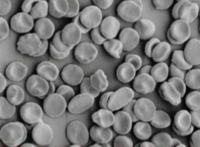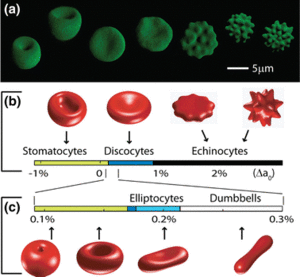Red blood cell

Red blood cells (RBCs), or erythrocytes, are the most common type of blood cell in the human body.
Discoctyes are normally shaped red blood cells and stomatocytes are cup-shaped red blood cells[1] which may appear to have a slit shape in the center, like a coffee bean.
In ME/CFS

Red blood cell abnormalities have been found in patients with chronic fatigue syndrome and Gulf War Illness
A small study of veterans with Gulf War Illness found increased deformability (the ability of erythrocytes to change shape under a given level of applied stress without rupturing) along with increased mean corpuscular hemoglobin (MCH), mean corpuscular hemoglobin concentration (MCHC) and red blood cell distribution width (RDW).[2]
A 1989 study found higher numbers of cup-form red blood cells known as stomatocytes in ME patients versus controls.[3]
Studies
- 1989, Red blood cell morphology in chronic fatigue syndrome.[4]
- 1991, Red blood cell magnesium and chronic fatigue syndrome.[5]
- 1994, Normal red cell magnesium concentrations and magnesium loading tests in patients with chronic fatigue syndrome.[6]
- 2004, Autonomic function and serum erythropoietin levels in chronic fatigue syndrome.[7]
- 2018, Red blood cell deformability is diminished in patients with Chronic Fatigue Syndrome.[8]
- 2018, Abnormal rheological properties of red blood cells as a potential marker of Gulf War Illness: A preliminary study.[2]
See also
References
- ↑ Khairy, Khaled; Foo, JiJinn; Howard, Jonathon (September 3, 2008). "Shapes of Red Blood Cells: Comparison of 3D Confocal Images with the Bilayer-Couple Model". Cellular and Molecular Bioengineering. 1 (2): 173. doi:10.1007/s12195-008-0019-5. ISSN 1865-5033. PMC 2963995. PMID 21031149.
- ↑ 2.0 2.1 Falvo, Michael J.; Chen, Yang; Klein, Jacquelyn C.; Ndirangu, Duncan; Condon, Michael R. (2018). "Abnormal rheological properties of red blood cells as a potential marker of Gulf War Illness: A preliminary study". Clinical Hemorheology and Microcirculation. 68 (4): 361–370. doi:10.3233/CH-170262. ISSN 1875-8622. PMID 29660926.
- ↑ Simpson, LO (1989), "Nondiscocytic erythrocytes in myalgic encephalomyelitis", The New Zealand Medical Journal, 102 (864): 126-127, PMID 2927808
- ↑ Lloyd, A.; Wakefield, D.; Smith, L.; Isbister, J.; McGrath, M.; Collings, A.; Bajenov, N. (July 22, 1989). "Red blood cell morphology in chronic fatigue syndrome". Lancet (London, England). 2 (8656): 217. ISSN 0140-6736. PMID 2568543.
- ↑ Cox, I. M.; Campbell, M.J.; Dowson, D. (March 30, 1991). "Red blood cell magnesium and chronic fatigue syndrome". Lancet (London, England). 337 (8744): 757–760. ISSN 0140-6736. PMID 1672392.
- ↑ Hinds, G.; Bell, N.P.; McMaster, D.; McCluskey, D.R. (September 1994). "Normal red cell magnesium concentrations and magnesium loading tests in patients with chronic fatigue syndrome". Annals of Clinical Biochemistry. 31 (Pt 5): 459–461. doi:10.1177/000456329403100506. ISSN 0004-5632. PMID 7832571.
- ↑ Winkler, Andrea S.; Blair, Dorothy; Marsden, Joanne T.; Peters, Timothy J.; Wessely, Simon; Cleare, Anthony J. (February 2004). "Autonomic function and serum erythropoietin levels in chronic fatigue syndrome". Journal of Psychosomatic Research. 56 (2): 179–183. doi:10.1016/S0022-3999(03)00543-9. ISSN 0022-3999. PMID 15016575.
- ↑ Saha, Amit K.; Schmidt, Brendan R.; Wilhelmy, Julie; Nguyen, Vy; Abugherir, Abed; Do, Justin K.; Nemat-Gorgani, Mohsen; Davis, Ronald W.; Ramasubramanian, Anand K. (December 28, 2018). "Red blood cell deformability is diminished in patients with Chronic Fatigue Syndrome". Clinical Hemorheology and Microcirculation. doi:10.3233/CH-180469. ISSN 1875-8622. PMID 30594919.

